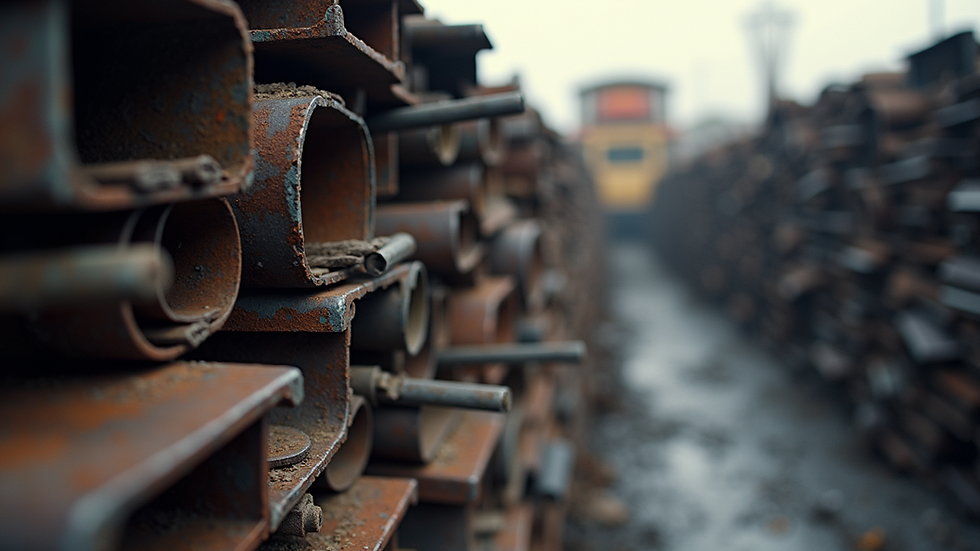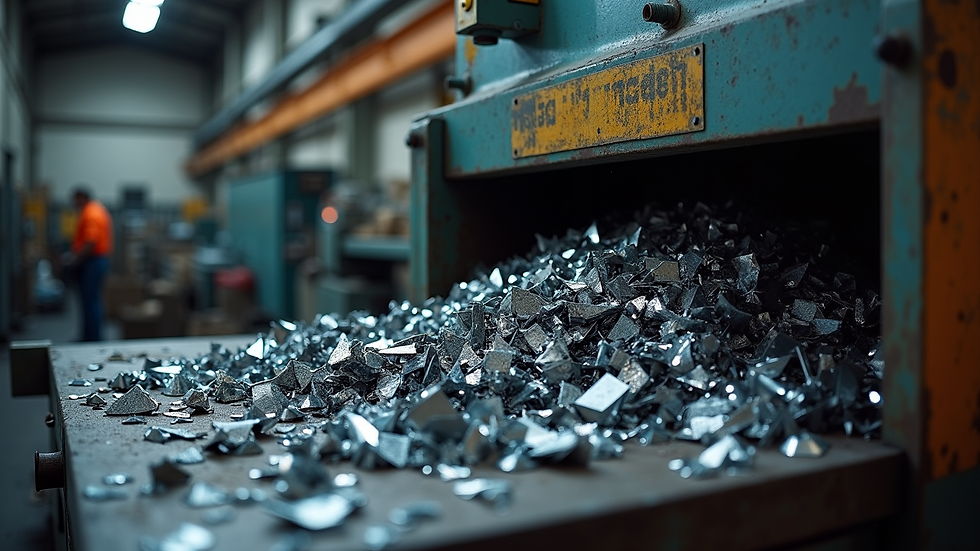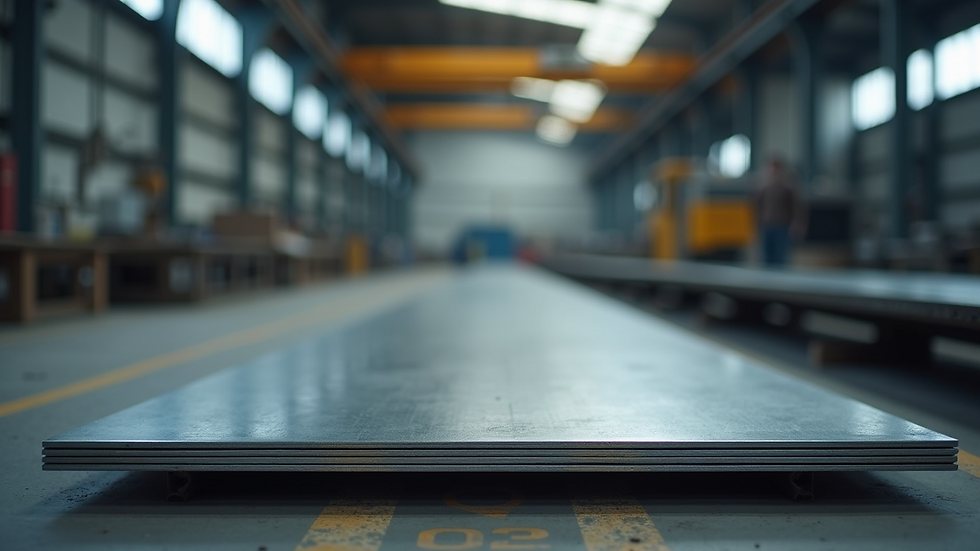The Role of Scrap Metal in Industrial Recycling
- cswanson79
- Aug 15
- 4 min read
Industrial recycling plays a crucial role in today's efforts to promote sustainability and reduce environmental impact. Among the many materials recycled, scrap metal stands out as a vital resource. Recycling scrap metal not only conserves natural resources but also saves energy and reduces greenhouse gas emissions. Companies such as Premier Metal Buyers play a key role in facilitating sustainable scrap metal recycling for industrial clients. This article explores the importance of scrap metal in industrial recycling, the processes involved, and practical ways industries can optimize their recycling efforts.
Understanding Industrial Recycling and Its Importance
Industrial recycling refers to the process of recovering waste materials generated by manufacturing and industrial activities and converting them into reusable raw materials. This practice helps reduce the demand for virgin resources, lowers production costs, and minimizes landfill waste.
In the context of metals, recycling is especially significant because metals are finite resources that require substantial energy to extract and process. By recycling metals, industries can:
Conserve natural resources such as iron ore, bauxite, and copper.
Reduce energy consumption since recycling metals uses less energy than mining and refining.
Lower greenhouse gas emissions associated with metal production.
Decrease landfill waste by diverting scrap metal from disposal sites.
Industrial recycling is a win-win for both the environment and the economy, making it a key component of sustainable industrial practices.

The Process of Recycling Scrap Metal in Industrial Settings
Recycling scrap metal in industrial environments involves several key steps to ensure the material is properly processed and reused. These steps include:
Collection and Sorting
Industrial facilities generate various types of scrap metal, including steel, aluminum, copper, and brass. Proper collection and sorting are essential to separate metals by type and grade. This improves the quality of recycled material and increases its market value. Premier Metal Buyers assists industries in efficiently collecting and sorting their scrap metals, ensuring top market value and proper material handling.
Processing and Shredding
Once sorted, scrap metal is processed to reduce its size. Shredding breaks down large pieces into smaller fragments, making it easier to melt and purify.
Melting and Purification
The shredded metal is melted in furnaces designed for specific metals. During melting, impurities are removed to ensure the recycled metal meets quality standards.
Solidification and Manufacturing
The purified molten metal is cast into ingots, sheets, or other forms that can be used by manufacturers to produce new products.
By following these steps, industries can efficiently recycle scrap metal and contribute to a circular economy.

Benefits of Using Recycled Metals in Manufacturing
Using recycled metals in manufacturing offers numerous advantages beyond environmental benefits. These include:
Cost Savings: Recycled metals often cost less than virgin metals due to lower extraction and processing expenses.
Energy Efficiency: Recycling metals consumes up to 95% less energy compared to producing metals from raw ore.
Improved Supply Chain Stability: Recycling reduces dependence on volatile raw material markets and geopolitical risks.
Enhanced Corporate Social Responsibility (CSR): Companies that prioritize recycling demonstrate commitment to sustainability, which can improve brand reputation and customer loyalty.
For example, the automotive industry extensively uses recycled steel and aluminum to manufacture vehicle parts, reducing production costs and environmental impact simultaneously.

How to Optimize Scrap Metal Recycling in Industrial Operations
Industries looking to maximize the benefits of scrap metal recycling can adopt several practical strategies:
Implement Efficient Sorting Systems: Use automated sorting technologies such as magnetic separators and sensors to improve metal separation accuracy.
Train Employees: Educate workers on the importance of proper scrap handling and segregation to reduce contamination.
Partner with Reliable Scrap Metal Buyers: Collaborate with reputable companies such as Premier Metal Buyers, who specialize in industrial scrap metal recycling, to ensure fair pricing and responsible recycling.
Monitor and Track Scrap Metal: Use inventory management systems to track scrap metal generation and recycling rates, identifying areas for improvement.
Invest in On-site Processing Equipment: Consider installing shredders or balers to reduce scrap volume and improve handling efficiency.
By adopting these measures, industrial operations can enhance their recycling programs, reduce waste, and improve profitability.
Future Trends in Industrial Scrap Metal Recycling
The future of industrial scrap metal recycling looks promising, driven by technological advancements and increasing environmental regulations. Some emerging trends include:
Advanced Sorting Technologies: Artificial intelligence and machine learning are being integrated into sorting systems to improve precision and speed.
Circular Economy Models: More industries are adopting circular economy principles, designing products for easier recycling and reuse.
Sustainability Reporting: Companies are increasingly required to report their environmental impact, encouraging better recycling practices.
Innovations in Metal Recovery: New methods for recovering metals from complex waste streams, such as electronic scrap, are being developed.
These trends will help industries further reduce their environmental footprint and create more sustainable production cycles.
Industrial scrap metal recycling is a cornerstone of sustainable industrial practices. By understanding its processes, benefits, and optimization strategies, industries can play a vital role in conserving resources and protecting the environment. Partnering with experienced scrap metal buyers like Premier Metal Buyers can help industries navigate these processes with confidence and acheieve greater sustainability results. Embracing these practices today will pave the way for a greener, more efficient industrial future.




Comments